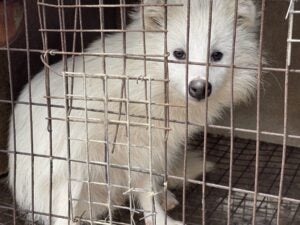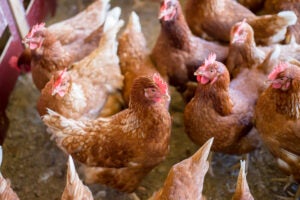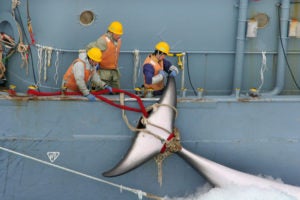
LONDON―A bill to ban UK fur imports and sales will be introduced to Parliament tomorrow by Ruth Jones, Labour MP for Newport West and Islwyn. The Fur Free Britain campaign, led by animal protection charity Humane Society International/UK, welcomed the tabling of this draft law as a significant step forward.
The bill proposes to extend existing bans on trade in fur from cats, dogs and seals to include foxes, raccoon dogs, mink, chinchilla, coyotes and other animals killed for fur fashion, and prevent the import and sale of new animal fur from all species. If passed into law, the ban would end the UK’s complicity in the cruelty of the global fur trade. HSI/UK estimates that the amount of fur imported into the UK over the five years 2019-2023 equates to approximately 7 million animals brutally killed.
Fur farming has been illegal across the UK since the Fur Farming (Prohibition) Acts were brought into force in 2003 under a Labour Government. Despite this, importing fur into the UK and selling it here is still allowed. Fur Free Britain campaigners are calling on the government to strongly back the new bill and finally put an end to this double standard. Their Fur Free Britain campaign is supported by a host of celebrities including Dame Judi Dench, Stella and Sir Paul McCartney, Leona Lewis OBE, Paloma Faith, Simon Pegg, Sue Perkins, Alesha Dixon, Kirsty Gallacher and Pete Wicks.
Ruth Jones MP said: “Footage of terrified foxes on fur farms breaks my heart and I can’t comprehend why anyone would inflict this kind of cruelty on an animal for a bit of frivolous fashion. I have heard about the issue from hundreds of my constituents in Newport West and Islwyn and I am delighted to introduce this Bill to reflect their concerns. It is about time we shut up shop on this cruel and unnecessary trade and a fur import ban would send a powerful message to the rest of the world.”
In a study published in Nature last month, scientists studying animals farmed for their fur in China identified 39 viruses classed as “potentially high-risk” for transmission to humans, including 13 novel viruses and 11 zoonotic viruses which can be transmitted from animals to humans. The paper’s authors warn that fur farms act as a hub for transmitting viruses. Top British virologists from Imperial College London’s Department of Infectious Disease have also warned that fur farms are a ticking time bomb for another pandemic and that farming mink for fur should be considered the same risk level as the bushmeat trade and live animal markets due to the threat it poses for the emergence of future disease outbreaks.
Claire Bass, Humane Society International/UK’s senior campaigns and public affairs director, said: “I’ve looked into the eyes of hundreds of animals on fur farms in Finland and these animals are broken souls, tormented their whole lives in tiny barren wire cages, often suffering agonizing untreated wounds and deformities. We know that millions of British people are disgusted by the fact that animals are suffering like this overseas to end up as a piece of fur trim sold here in the UK, so we are enormously grateful to Ruth Jones for introducing this extremely popular bill for a Fur Free Britain. We urge the Labour Government to back the ban.”
National polling carried out in April 2022 revealed that 77% of British citizens think the government should ban the importation of animal products such as fur, where the production methods are already banned in the UK. The Fur Free Britain campaign has so far gathered over 1.2 million petition signatures calling for a ban on the import and sale of fur in the UK. Most of the world’s major fashion-houses have already gone fur-free, including Chanel, Dolce & Gabbana, Saint Laurent, Valentino, Prada, Gucci, Versace, Alexander McQueen, Balenciaga and Armani.
Sonul Badiani-Hamment, UK country director of FOUR PAWS UK, Fur Free Britain coalition partner said: “Ruth Jones’ Private Member’s Bill presents a powerful opportunity for the Government to end our association with the cruel and high-risk fur trade once and for all. Over two decades have passed since fur farming was banned in the UK by the then Labour Government. Now this Bill presents them with an opportunity to fully address our role in what is left of the cruel trade and stop importing and exporting cruelty for good. By implementing a nationwide ban on the import and sale of fur products, we can help save the lives of millions of animals who are needlessly killed for their fur, and Labour can start fulfilling their promise to deliver the biggest boost to animal welfare in a generation.”
Mark Glover, chair of the Labour Animal Welfare Society, said: “We are delighted to be working with Ruth Jones MP on this groundbreaking bill that would put an end to Britain’s role in the horrific suffering endured by animals on fur farms. By banning the import of fur products, Britain will no longer contribute to the unimaginable pain and torment that is needlessly inflicted on animals in the fur trade. The Labour government banned fur farming in the UK over 20 years ago as it offends public morality, and this bill would close the loophole that allows the importation of products that are illegal to produce here. We strongly urge the government to honour the public’s belief in the humane treatment of animals by supporting this bill.”
Recent reports by FOUR PAWS UK and HSI/UK set out the environmental impact of the fur industry and its links to environmental degradation. Harsh chemicals are used throughout the production of fur, including some that are hazardous and carcinogenic. The environmental impacts of mink, fox and raccoon dog fur production significantly exceed those of other materials used in fashion, including cotton and even polyester and acrylic used to make faux fur. A significant component of fur’s carbon footprint is the vast quantity of animal products fed to carnivorous animals on fur farms, and fur farms can also pollute local waterways with manure.
ENDS
Media contact: Sally Ivens, senior media manager, HSI/UK: sivens@hsi.org
View images/video from HSI’s latest (2023) investigation into Chinese fur farms; and (2021) investigation into Finnish fur farms. To download these visuals, email: sivens@hsi.org
Notes:
- Tens of millions of animals suffer and die each year in the global fur trade. The majority of animals killed for fur are reared in barren battery cages on fur farms.
- HMRC records show that almost £40million of fur (£39,703,694) was imported to the UK in 2023 from countries including China, Finland, Spain, Greece and Poland.
- In addition to the physical and psychological torment of being confined in small, barren cages for their entire lives, the killing methods typically used on fur farms are equally distressing. Mink are killed by gassing, foxes and raccoon dogs are killed by anal electrocution and investigations also show animals commonly bludgeoned to death on farms in China.
- Wild animals like coyote and raccoons who are trapped for their fur, fare little better – they can languish in agony in cruel traps for hours or even days before dying from dehydration, starvation, attacks by predators or by being killed when the trapper returns. HSI’s 2022 joint undercover investigation into trapping in the US revealed shocking cruelty and animals suffering protracted and violent deaths. Report available here.
- Mink on almost 500 fur farms across 13 countries have been infected with COVID-19 which can be transferred from humans to farmed mink, between mink and from farmed mink to humans. Further, around 500,000 foxes, mink, raccoon dogs and sable have been ordered killed on public health grounds after Highly Pathogenic Avian Influenza A (H5N1) was found on more than 70 fur farms in Spain and Finland.
- The Conservative Government stated it would “explore potential action” on the fur issue under its May 2021 Action Plan for Animal Welfare. It launched a Call for Evidence which attracted around 30,000 responses, of which an FOI request revealed over 96% strongly agreed that it is wrong for animals to be killed for the sake of their fur. Its full findings are yet to be published. At a Westminster Hall Debate in June 2023, a Defra Minister confirmed the Animal Welfare Committee had been commissioned to produce a report, by end of 2024, on “the issue of responsible sourcing in the fur industry, including the animal welfare standards and safeguards that apply to fur imported into this country.” During the June 2023 debate, Labour’s shadow Defra minister, Alex Sobel MP, stated: “a Labour Government would take the necessary action on the importation of fur into Britain. We are committed to this. … A Labour Britain will be a compassionate, fur-free Britain.”








